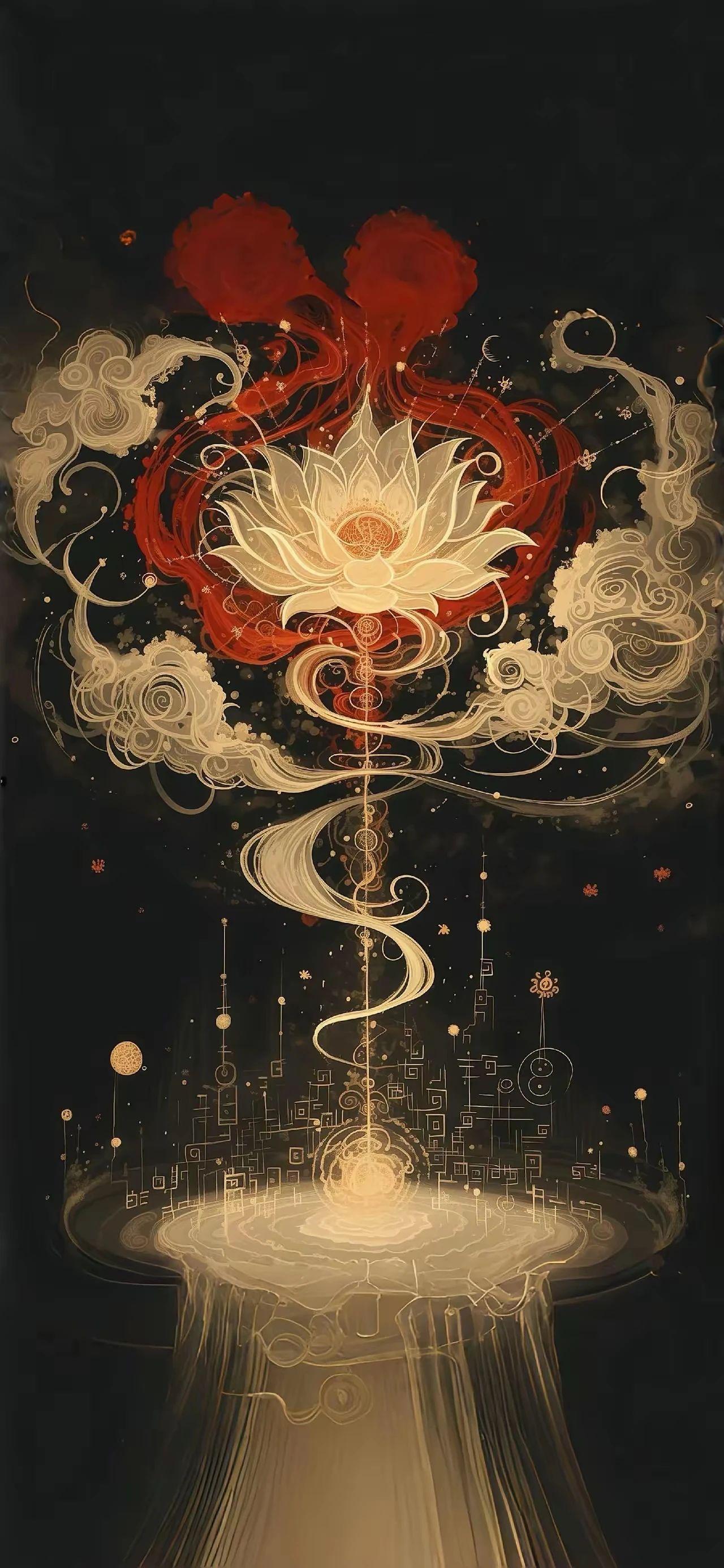In a deep mountain enveloped by clouds and mist stands a serene Taoist temple. Within the temple resides a highly esteemed Taoist priest and a group of diligent and eager-to-learn disciples. This place is far removed from the clamor of the world, resembling a paradise on earth, replete with tranquility and peace.
One day, sunlight filtered through the gaps in the leaves and cast patches of light upon the courtyard of the Taoist temple. The Taoist priest and the disciples were strolling in the courtyard, savoring this rare moment of serenity. The Taoist priest gazed at the sky, lost in thought, and then abruptly asked, "Is the sky vast?" The disciples raised their heads in unison and looked at the boundless expanse of the sky, answering in chorus, "Yes, it is vast." That voice was crisp and resounding, as if echoing the immensity of the sky.
The Taoist priest nodded slightly, then bent down and picked up a leaf, holding it in his hand as he asked, "Is the leaf large?" The disciples regarded the tiny leaf and shook their heads one after another, saying, "No, it is not large." Their eyes were filled with confusion, unable to fathom why the Taoist priest would pose such a question.
The Taoist priest looked at the disciples and continued to inquire, "Can the sky obstruct people's vision?" The disciples once again gazed at the sky. The azure expanse was endless. They replied without hesitation, "No, it cannot." The sky is so vast that how could it block people's eyes?
The Taoist priest asked again, "Can a leaf block people's eyes?" The disciples hesitated. They looked at the leaf and pondered the Taoist priest's question. Some disciples said it could not, for the leaf is so small. How could it block people's eyes? But others said it could, for if the leaf is very close to the eyes or precisely in a key position in the line of sight, it may indeed block people's eyes.
After listening to the disciples' responses, the Taoist priest smiled and nodded. He then began to recount a Taoist allusion. "A long, long time ago, there was a man named Zhuang Zhou. Zhuang Zhou dreamed that he had transformed into a butterfly and was fluttering freely among the flowers. After waking up, Zhuang Zhou was plunged into deep thought. He did not know whether he had dreamed of the butterfly or the butterfly had dreamed of him. This allusion tells us that people are often confounded by the appearances of the external world and forget their true selves. Just like this leaf, if we pay excessive attention to it, it may block our sight and prevent us from seeing the broader sky."
The Taoist priest then stated, "In our lives, we frequently encounter such situations. Sometimes, some trifling matters, just like this leaf, will block our eyes and lead us astray. These things may be a minor setback, a small argument, or a minor failure. They seem insignificant, but if we cannot handle them properly, they may plunge us into difficulties from which we cannot extricate ourselves."
"For instance, in Taoist thought, there is an important concept known as 'governing by doing nothing'. 'Governing by doing nothing' does not mean doing absolutely nothing. Instead, it means following the laws of nature and not overly interfering or forcing. If we encounter difficulties in life, we should not be in a hurry to solve them. Instead, we must first calm down, contemplate the essence of the problem, and find the root cause. Only in this way can we truly resolve the problem rather than being beset by it."
"Another example is that there is a concept in Taoism called 'The Tao gives birth to one. One gives birth to two. Two gives birth to three. Three gives birth to all things.' This concept informs us that all things are born from the Tao. The Tao is the origin and law of the universe. We should learn to view problems from the perspective of the Tao and not be misled by superficial phenomena. When we encounter difficulties, we should believe in the power of the Tao, trust in the laws of nature, and be confident that everything will be all right."
After listening to the Taoist priest's words, the disciples fell into deep contemplation. They began to reflect on their own lives and think about those "leaves" that had once blocked their vision. Some disciples recalled that they had been despondent for a long time because of a minor failure in an exam and had almost given up their studies. Some remembered that they had been angry for a long time because of an argument with a friend and had almost lost this friend. Some recollected that they had once doubted their abilities because of a minor failure and had almost lost confidence.
The Taoist priest looked at the disciples and said earnestly, "Children, difficulties and setbacks in life are inevitable. However, we must not allow these small 'leaves' to block our eyes, cloud our minds, or impede our progress. We must learn to put down these 'leaves', raise our heads, and look at the vast sky. Only in this way can we maintain a clear head, find the right direction, and tread the path to success."
From then on, the disciples were no longer troubled by trifling matters in life. They learned to face difficulties and setbacks with a peaceful attitude, treat others with tolerance, and pursue their dreams with a positive mindset. They knew that on the road of life, there would be many "leaves" blocking their sight, but as long as they held that vast sky in their hearts, they would surely be able to overcome difficulties and march towards success.
In our lives, we are also often beset by some small "leaves". These "leaves" may be our greed, our jealousy, our fear, our laziness, and so on. They will make us lose our senses and make wrong decisions. However, if we can, like the Taoist priest taught the disciples, learn to put down these "leaves" and maintain a peaceful, tolerant, and positive heart, we will undoubtedly be able to see that vast sky and move towards a beautiful future.



